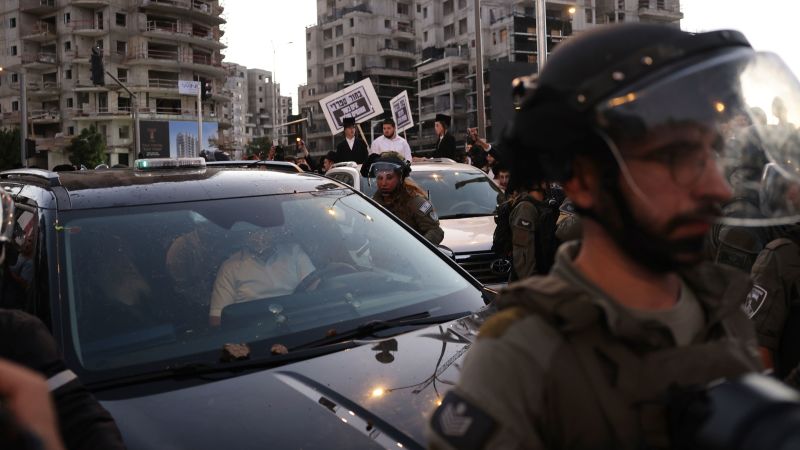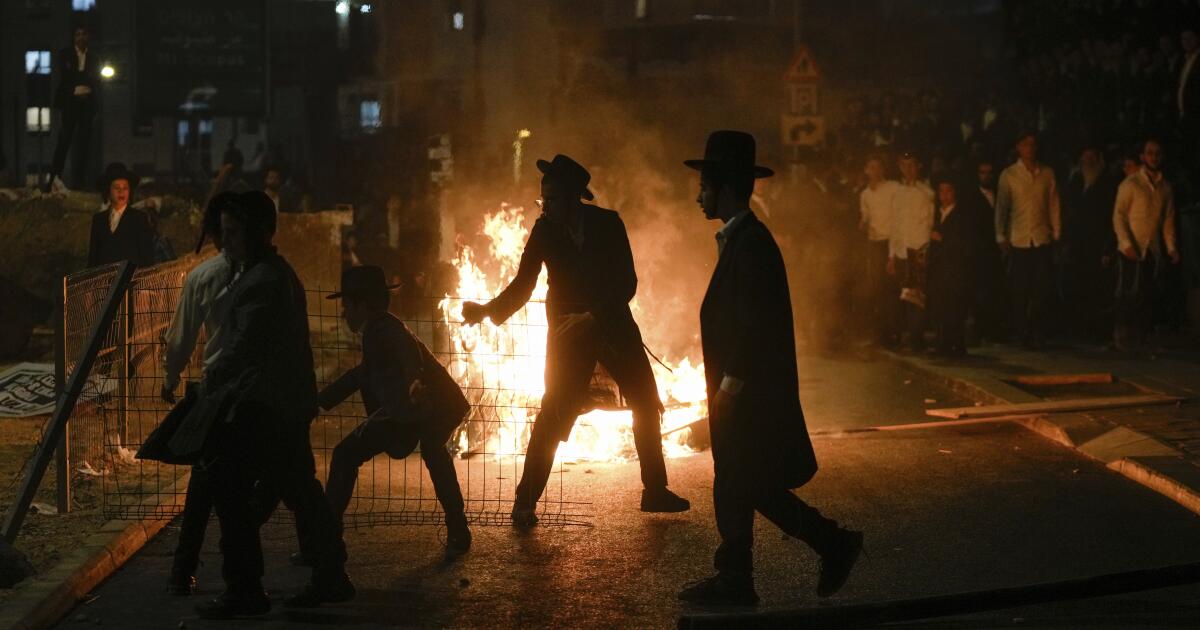A Supreme Court decision mandating their conscription has triggered unrest with thousands of ultra-Orthodox Israelis taking to the streets in protest.

Also Read: Bolivia Army Chief Arrested After Coup Attempt
The protests occurred on June 30, 2024 in Jerusalem. Ultra-Orthodox Jewish protesters attacked the car of Yitzhak Goldknopf, Israel’s housing minister.
Yitzhak Goldknopf, a member of the United Torah Judaism party was targeted during the incident but was safely evacuated by police.
The protests turned violent with protestors clashing with law enforcement, throwing stones and setting fires in the streets.
Police used force to disperse the crowd including water cannons and other crowd-control measures leading to several arrests. Five individuals were arrested and several police officers sustained injuries during the confrontation.
The Israeli Supreme Court issued a ruling on June 25, 2024, that mandates the conscription of Ultra-Orthodox Jewish men into the military.
Ultra-Orthodox Jews have been exempt from mandatory military service in Israel, a policy in place since the country’s founding.
The ruling also stipulates that government funding for religious schools (yeshivas) will cease if their students do not comply with the draft requirements.
The ruling has sparked anger and protests among the Ultra-Orthodox community, which views military service as incompatible with their religious lifestyle.
There is dissent within the Ultra-Orthodox community against lawmakers who supported lowering the draft exemption age from 26 to 21.
Protestors lit fires, threw rocks and attacked vehicles including those of government officials. Videos circulated on social media showing aggressive actions towards Goldknopf’s car.
The protest also saw the participation of children and teenagers, some of whom were seen near dumpster fires. Former United Torah Judaism leader Yaakov Litzman’s car was also attacked.
Military service is compulsory for most Jewish men and women in Israel. Ultra-Orthodox Jews, or Haredim, have historically been exempt from military service. This exemption was rooted in agreements from the early days of the state.
Last week, the Israeli Supreme Court issued a ruling that mandates the government to begin drafting ultra-Orthodox men into the military.
Also Read: Kenya Finance Bill Protests: 13 Killed and Set Parliament on Fire
This decision is a shift in policy and threatens to disrupt the status quo. The ruling also stipulates that funding to yeshivas that do not comply with the draft requirements will be halted.
Tens of thousands of ultra-Orthodox men participated in the protest in Jerusalem. Initially concentrated in an ultra-Orthodox neighborhood, the protest escalated as the crowd moved toward central Jerusalem.
Protesters clashed with police, throwing rocks and attacking the car of an ultra-Orthodox Cabinet minister.
Israeli police used water cannons filled with skunk-scented water and mounted officers to disperse the crowd. The protest remained uncontrolled late into the night.
The ultra-Orthodox parties are members of Prime Minister Benjamin Netanyahu’s governing coalition. Their support is essential for maintaining the government’s stability.
The court ruling and protests have the potential to destabilize Netanyahu’s coalition. The ultra-Orthodox parties have not yet decided whether to leave the government, but their departure could trigger new elections, a risky move given the coalition’s declining popularity since the October 7 Hamas attack that ignited the current conflict in Gaza.
The exemptions for ultra-Orthodox men have bred resentment among the Israeli public. This sentiment has intensified during the war against Hamas, which has seen over 600 soldiers killed and tens of thousands of reservists called up.
Many Israelis support the Supreme Court’s decision, viewing it as a step towards greater social equality and fairness.
The demand for shared responsibility in national defense is seen as increasingly urgent given the conflict with Hamas.
Many Ultra-Orthodox Jews see military service as a threat to their religious studies and way of life. Religious figures have voiced strong opposition to any compromises on this issue.
Protesters carried signs with messages such as “We will not enlist in the enemy army” and “We will die and not enlist.”
Also Read: Protests Erupt in New Caledonia After Pro-Independence Activists Sent to France





















